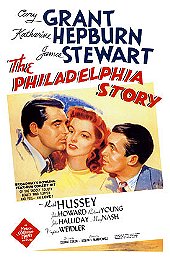''The time to make up your mind about people is never.''
When a rich woman's ex-husband and a tabloid-type reporter turn up just before her planned remarriage, she begins to learn the truth about herself.
Cary Grant: C.K. Dexter Haven
Katharine Hepburn: Tracy Lord
James Stewart: Macaulay Connor
Philadelphia Story is a hilarious comedy, starring Cary Grant, Katharine Hepburn, and James Stewart. With that cast, along with a great script and inspired direction, make this movie a treat to watch.
The three stars are obviously the Story at work here, but minor characters also play an influential part. To the extent in which the older adult members of Hepburn's family have no clue as to what is transpiring, while the child clearly does, is most amusing. It ought to be said that Philadelphia Story is far from all that humourous. The sense of humour is more of the clever and fleeting kind of variation. Most of it arises either from Grant's splendid persona, with his wry, charismatic tones, or Hepburn's flighty, beguiling, enchanting mannerisms. I would say that Grant is to a degree under used in his role, as there are very large stretches of the picture where he is not on screen. Stewart is however excellent, playing a sensitive, artistic type who understandably is somewhat taken by Hepburn's Tracy Lord. All three stars are much in their element and they bask in it's glory, with accents as remembered by all, and a fitting social setting.
As has been said by some other film scribe, "a strong case is being made as to the sheer irresistibility of the film's female star". Katharine Hepburn is shown at her most statuesque and in a beautiful disposition. Her character has an impressive array of fine lines to deliver also, and is treated with dignity and understanding by the effective script. It is in some ways a voyage of self discovery for Hepburn's Miss Lord. Ranging from a rejection of her anointed goddess status, a rejection of marriage for mere hierarchical gain and a deeper understanding of the meaning of love.
The film's about-face ending is quite charming really, mixing the conservative with the progressive. Conservative in that marriage is seen to have to take place, and in the characters returning to earlier relationships. It could indeed be argued that not enough had been made of Stewart's relations with Ruth Hussey's character. Progressive it could be said, in that events have been very quickly turned upside down, and love over society is championed. Also, perhaps most tellingly, the drunken indiscretion of Hepburn is not just forgiven, but seen as part of her self-discovery. This film in its treatment of a liberated woman such as Hepburn, must be praised for its sensitivity and liberal understanding. All too often, Hollywood allowed the reactionary and the puritanically conservative to lazily dominate its films.
We are presented with an upper-middle class milieu, with contrasts provided by Grant's hard-bitten aristocratic dandy and John Howard's dullard "man of the people" politician. There is nothing staggering about the film's assertion that the upper classes can be perfectly charming and noble, whilst those of the lower classes, like Howard, can be lacking charm and appear materialistic. It seems merely to be making a point of its very balance, and is almost a fig leaf to those who would have expected a simplistic socialist line.
Need it be mentioned that Cukor's direction is excellent? Making an art form of the unobtrusive, he lets the camera just take in the performances and the script, without distraction. He captures Hepburn in a radiant and sensitive light that I suppose slightly overshadows the male leads. There are artistic shots at times, that evoke occasional counterpoint to the usual images of the starts. One lingering shot of the precocious child watching from out of her window the night's events, is a good example of this working to great effect. An effect of establishing a wider, but still near-motionless canvass to the story.
Philadelphia Story is cleverly and entertainingly written, and delightfully well acted by all involved. It's hard to imagine anyone finding it dull or beneath them, but apparently some people can find anything beneath them. Indeed their defeat. If you haven't seen this, please do. If you haven't seen it in a while, give it another viewing. You won't be disappointed. It's standards and assumptions are a bit dated, but the humour, wit, and heart are certainly not.
9/10
 Login
Login